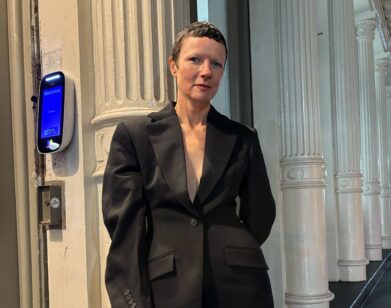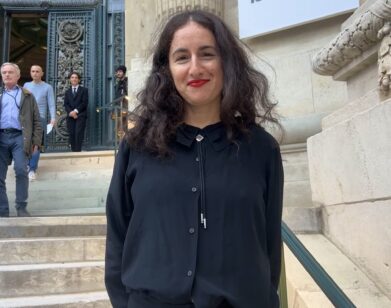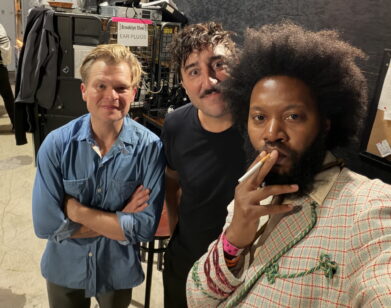SMOKE BREAK
Inside Stephanie LaCava’s Novel of Dissociation, Death Metal, and Espionage
THURSDAY 6:55 PM OCTOBER 16, 2025 DOWNTOWN
Stephanie LaCava’s Nymph, her follow-up to the sad girl staple I Fear My Pain Interests You, is the kind of book you can judge by its very good cover, featuring doe-eyed model Uschi Obermaier, 60s muse, German revolutionary, and international woman of mystery. In LaCava’s words, Obermaier was “a lot of things,” much like Nymph‘s protagonist Bathory, named for the Swedish metal band and born into a family of covert agents and assassins. Bathory is also a linguist and prostitute, tactfully deploying all three of her skills to create an emotional distance between herself and the world.
Last Thursday, for the book’s official launch party, I pulled up to the Essex Card Shop, one of the local haunts by which LaCava was inspired while writing. The author, clad in a trench coat, baseball cap, velvet microshorts, and thigh-highs, was waiting for me outside—the embodiment of the spirit of Nymph: undercover but still the main character. On the way to her reading at Mast Books, we lit up a Marlboro Red (in honor of her military ex) and delved into the novel’s major themes and LaCava’s own obsessions: estrangement, psychoanalysis, and basketball.
———
JULIETTE JEFFERS: One of the first things I thought about regarding Nymph is that it’s very much set in our real, material world. Like, it’s literally set where we are now.
STEPHANIE LACAVA: Yeah.
JEFFERS: But it’s also a book of signs and symbols, and Bath, the protagonist, is in this constant state of decoding the world. What made you want to write this book that’s about code and operating on this symbolic level?
LACAVA: I think all my storytelling is about that in some way or another, because it’s trying to make sense of all the signs and signals and impulses. And it’s always a way of trying to figure something out. In a way, the storytelling itself is a chart of trying to decode things, human things.
JEFFERS: Also, a female protagonist with a lonely childhood is a theme between I Fear My Pain Interests You and Nymph.
LACAVA: And the other one too.
JEFFERS: Yes. Is there an obsession there with the loneliness of childhood?
LACAVA: It’s definitely something that I always want to go back to and know a little bit about why the character became who they are. And there’s always a mother, a complicated relationship with a mother.
JEFFERS: And a father.
LACAVA: A friend said something really funny to me. She’s like, “I know all of your books are about parents, and I’ve never heard you once talk about your parents.” I was like, “That’s really interesting actually.” That’s how I talk about my parents.
JEFFERS: Yeah.
LACAVA: I always thought I wanted to have the classic childhood and it was something that always eluded me, because you don’t really have control over what kind of childhood is handed to you. Which is also a theme in all of the books: the lack of control, what you’re saddled with when you’re born, and your inheritance. And a lot of these young girls, they’re just thrust into these places where they’re adrift, alone.
JEFFERS: There’s the scene early on in the book when Bath’s in this mansion with Iggy, and then the mansion is ambushed by these opps.
LACAVA: Yeah. The opps come to the mansion.
JEFFERS: And in that moment, she realizes her power over men. And that, too, feels like a theme throughout the book, this power that she comes into, even though it’s a cold power.
LACAVA: And it’s quite dark. Right? But she’s not devastated by what just happened to her. She chooses instead to refuse to let this tragic, violent act define who she is. That’s also, obviously, the beginning of the detachment. It’s a way of surviving what just happened to her.
JEFFERS: Yeah. She lives in this world of extreme detachment. There’s this veil between her and everything. Can we talk about basketball?
LACAVA: Yeah. We can always talk about basketball. Do you want to go play basketball?
JEFFERS: Are we by courts…?
LACAVA: No. But there is actually a really good gym. Anyway, sorry. We can do that another time. We can play a pickup game.
JEFFERS: I’m terrible at basketball.
LACAVA: We can just practice a little. When I was a little girl growing up in France, I was on a basketball team, and it was this strange thing because it was so American. We played in a hollow, emptied-out pool, because there weren’t that many basketball courts at that moment.
JEFFERS: Wow.
LACAVA: I was on a team with Joakim Noah. He became a Chicago Bull. I went to school with him. It was all inter-grade, and we played in a hollowed-out pool. But yes, Kobe Bryant is a thing throughout the book, a symbol. He actually grew up in Italy, which not many people know, and similar to how I grew up as an expat.
JEFFERS: Wow, I had no idea.
LACAVA: And so that’s always been a connective tissue for me, as well. You can find these amazing photos of him on the basketball team as a kid in Italy at his school. And one of the great videos that’s quoted actually in the book is the one where he’s like, “I was alone all the time and I practiced. I had no friends.” I think another part of having a lonely, focused childhood is that you acquire a skill. Kobe alludes to being an assassin sometimes when he’s giving talks. And for Bath, it becomes a symbol of a focus, of the ability to decide what happens to you.
JEFFERS: Can we talk about the cover imagery?
LACAVA: Yeah.
JEFFERS: Who is it in the image?
LACAVA: So, it’s Uschi Obermaier. She’s originally from Munich, I think, and she was this great model who was shot by Avedon and Helmut Newton. She became the face of the ’68 demonstrations in Berlin and Kommune 1 because she was dating one of the guys and she lived with them. She was in the band Amon Düül. She played the maracas and she sang and she would travel the world with the guy she was with and had this unconventional existence. She was legendarily, like, Jimi Hendrix’s lover. You can find this great video of them leaving a hotel. She was saddled also with all this imagery that she had to carry, but it also allowed her to move between worlds.
JEFFERS: And she was a woman of mystery. Do you know that Sally Mann book At Twelve?
LACAVA: Yeah.
JEFFERS: There’s a photo in there that reminds me a lot of the cover. And then on the back you have the deep sea–
LACAVA: That’s the Rembrandt. This was a very narrative painting for him. And it’s still not been recovered. It was stolen from the Isabella Stewart Gardner Museum in the ’90s, so that’s why it hangs in the mansion in the book. They’re all stolen paintings that are hanging in the mansion. And then the street that we’re on is actually the street where that final flood occurs.
JEFFERS: Did you wander around here a lot when you were writing?
LACAVA: I’m here all the time. Like, almost every night really. And I just knew I wanted the Essex Card Shop to be the stand-in for Card Town. And it all happened from there.







